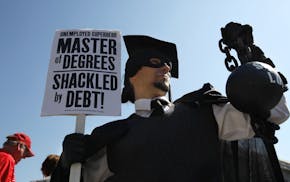Six years after his 21-year-old patient died because of a defective heart implant, Dr. Robert Hauser still wonders why no Guidant Corp. executive has faced criminal charges for selling a device they knew could fail.
"It's incredible and very disappointing," Hauser said last week. "How could there be no accountability?"
Good question, doctor, and one that's especially relevant as the medical-device industry rallies regulators and legislators around the principle of quicker approval for its products. The all-out lobbying campaign comes despite a string of product recalls and regulatory investigations that have cast an unseemly light on the industry's practices and cost shareholders hundreds of millions of dollars, but have resulted in precious few convictions.
Few of those cases proved as troubling as Guidant's 2005 recall of two models of defibrillators that have been associated with at least 13 deaths. Guidant knew about problems with the devices as early as 2002 but did not send out an advisory until three years later, after Hauser and his colleague at the Minneapolis Heart Institute, Dr. Barry Maron, shared the information and their concerns with the New York Times.
Guidant was eventually swallowed up by Boston Scientific, which paid $27 billion to acquire the Indianapolis-based firm and its Arden Hills-based cardiac rhythm management unit in 2006. By then, numerous criminal and civil investigations were already underway. In 2007 Boston Scientific paid $240 million to settle lawsuits brought by patients. Last month, the company pleaded guilty to two federal criminal misdemeanor charges related to the 2005 recall, including making false statements to the FDA about the devices' safety, and paid a $296 million fine.
Ten days later government lawyers sued the company again, this time for making false reimbursement claims to Medicare. The allegations in the 45-page complaint detail what Guidant knew, when it knew it, how it filed false documents with the FDA and why it allegedly chose not to notify doctors, patients, regulators or even its own sales force about the potentially life-threatening defects. It names specific executives who allegedly failed to act on more urgent measures recommended by their colleagues so as to avoid a general recall and notification to the FDA.
So, why haven't any of those executives been charged?
The U.S. attorney's office in Minneapolis, as per its custom, declined to confirm or deny the existence of a criminal investigation.
Boston Scientific doesn't seem to think it has much to worry about anymore. The new lawsuit may result in another hefty settlement, but on Wednesday CEO Ray Elliott told analysts that the earlier guilty plea closed down "the long-standing government criminal investigation into the 2005 recalls."
Criminal prosecutions over device recalls are infrequent for one simple reason: Devices aren't perfect, and a recall doesn't always mean someone engaged in fraudulent or misleading conduct. "Bad things happen with these products on a regular basis," said Steven Kowal, a Chicago attorney who represents device and drug companies. "It can be tough to pull together the evidence that shows one person acting with deliberate intent."
But Arthur Caplan, the director of the Center for Bioethics at the University of Pennsylvania, said that doesn't mean they shouldn't occur. "I do think the threat of criminal prosecution should be used more," he said. "In egregious cases it makes ethical sense to hold executives accountable for deaths and disability they directly permitted to happen."
In the past two years alone, the FDA issued recalls for 73 medical devices, more than were issued from 2000 to 2005. And just last month, St. Jude Medical paid $16 million to the U.S. Department of Justice to settle charges that fees paid to doctors for enrolling patients in postmarket studies were nothing more than kickbacks to induce doctors to use the company's products.
In recent months, the FDA has warned that it will be more aggressive in bringing criminal charges against individual executives. FDA Commissioner Margaret Hamburg said her agency considered misdemeanor prosecutions of individuals "a valuable enforcement tool."
Her deputy litigation chief, Eric Blumberg, warned that the agency could even make more frequent use of the Park Doctrine, which allows prosecutors to hold CEOs responsible for the crimes of their underlings, even if they had no specific knowledge of their actions.
"He's putting executives on notice," said Roger Thies, a Washington, D.C., attorney who represents clients before the FDA. "It's a scary proposition for senior executives to think that they could be criminally prosecuted for something that happened in their company that they were not aware of."
That seems like a harsh, but perhaps necessary, step. Why should shareholders be the only ones who pay if company executives behave badly?
ericw@startribune.com • 612-673-1736

Wieffering: Time to get over debit card fees
For Thrivent and others, warnings were there

With billions in sales, some co-ops are big business

